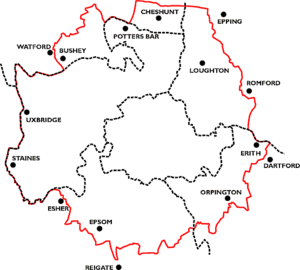Difference between revisions of "Metropolitan Police"
(Met Pol Inclusion and Diversity 2017-2021) |
(→LGBT history: LGBT Independent Advisory Group and liaison officers) |
||
| (2 intermediate revisions by the same user not shown) | |||
| Line 5: | Line 5: | ||
==LGBT history== | ==LGBT history== | ||
| − | There were intended to be [[LGBT Police Liaison Officer]]s in every borough, although by October 2012 some of the posts | + | Following the Soho bombing at the Admiral Duncan pub in April 1999 the Metropolitan Police established a Lesbian and Gay Advisory Group consisting of lay members who would be a critical friend to the police. This group is now called the LGBT Independent Advisory Group. |
| − | The Metropolitan Police 'Inclusion and Diversity Strategy 2017 –2021' | + | |
| + | In 1999 the MPS also established a force-wide network of lesbian and gay liaison officers. Volunteer officers in each borough policing command unit advised colleagues dealing with incidents and relevant police operations. | ||
| + | |||
| + | There were intended to be [[LGBT Police Liaison Officer]]s in every borough, although by October 2012 some of the posts were still vacant.<ref>http://www.met.police.uk/contacts/lgbt.htm</ref> | ||
| + | The Metropolitan Police 'Inclusion and Diversity Strategy 2017 –2021' stated that as an organisation they need to : 'Remain focused on employing, retaining and developing a representative workforce that is working in an inclusive and supportive environment' <ref> https://www.met.police.uk/SysSiteAssets/foi-media/metropolitan-police/policies/inclusion-strategy-2017-2021.pdf.</ref>. | ||
| + | |||
| + | After an MPS workforce reorganisation in 2018, police LGBTQ+ liaison officers were absorbed into broader community engagement teams. This reduced their focus on LGBT+ communities and their issues. Volunteers from the LGBTQ+ Police Staff Support Association tried to fill the gap through the LGBTQ+ advisor scheme. But, while well intentioned, they couldn’t meet the operational and community demands for support and information. This gap in service and communication was identified as one of the failings of the initial investigation into the murders by Stephen Port <ref> https://www.justiceinspectorates.gov.uk/hmicfrs/publication-html/inspection-of-the-metropolitan-police-services-response-to-lessons-from-the-stephen-port-murders/#7-inclusion-diversity-and-equalities-considerations-when-investigating-death </ref>. | ||
| + | |||
| + | Police officers marched in uniform in [[London Pride]] from 2003, but in 2022 uniformed officers from the Metropolitan Police did not join the parade, after organisers asked them not to take part. | ||
==References== | ==References== | ||
Latest revision as of 17:59, 18 May 2023
The Metropolitan Police is the police service covering Greater London, but excluding the City of London which has its own police force.
The Metropolitan Police was founded in 1829, and originally covered a rather larger area than it does today. From 1999 the area is coterminous with Greater London, and there is an operational command unit for each London Borough. At the head of the Metropolitan Police Service is the Commissioner. Since January 2012 the Commissioner reports to the Mayor's Office of Policing and Crime (MOPAC), which is headed by the Mayor of London.LGBT history
Following the Soho bombing at the Admiral Duncan pub in April 1999 the Metropolitan Police established a Lesbian and Gay Advisory Group consisting of lay members who would be a critical friend to the police. This group is now called the LGBT Independent Advisory Group.
In 1999 the MPS also established a force-wide network of lesbian and gay liaison officers. Volunteer officers in each borough policing command unit advised colleagues dealing with incidents and relevant police operations.
There were intended to be LGBT Police Liaison Officers in every borough, although by October 2012 some of the posts were still vacant.[1] The Metropolitan Police 'Inclusion and Diversity Strategy 2017 –2021' stated that as an organisation they need to : 'Remain focused on employing, retaining and developing a representative workforce that is working in an inclusive and supportive environment' [2].
After an MPS workforce reorganisation in 2018, police LGBTQ+ liaison officers were absorbed into broader community engagement teams. This reduced their focus on LGBT+ communities and their issues. Volunteers from the LGBTQ+ Police Staff Support Association tried to fill the gap through the LGBTQ+ advisor scheme. But, while well intentioned, they couldn’t meet the operational and community demands for support and information. This gap in service and communication was identified as one of the failings of the initial investigation into the murders by Stephen Port [3].
Police officers marched in uniform in London Pride from 2003, but in 2022 uniformed officers from the Metropolitan Police did not join the parade, after organisers asked them not to take part.
References
- ↑ http://www.met.police.uk/contacts/lgbt.htm
- ↑ https://www.met.police.uk/SysSiteAssets/foi-media/metropolitan-police/policies/inclusion-strategy-2017-2021.pdf.
- ↑ https://www.justiceinspectorates.gov.uk/hmicfrs/publication-html/inspection-of-the-metropolitan-police-services-response-to-lessons-from-the-stephen-port-murders/#7-inclusion-diversity-and-equalities-considerations-when-investigating-death
